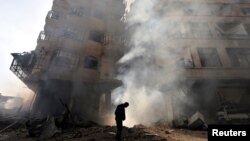JOHANNESBURG —
Representatives of international watchdog Human Rights Watch say in their annual report that they're concerned about Syria, Mali and other areas of so-called Arab Spring unrest. The New York-based group released its report Thursday in London and Johannesburg.
Human Rights Watch says the euphoria and hope that spurred the Arab Spring movements two years ago have not brought about more rights for the people.
The 665-page report released Thursday profiles human rights in more than 80 nations, including the United States.
Syria's violence and repression dominated this year's report. The nation has been besieged by a rebellion that has left at least 60,000 people dead, according to United Nations estimates.
Rampant war crimes
Human Rights Watch's executive director Kenneth Roth, speaking on a live telecast from London, called on Russia and China to impose stricter sanctions on Syria in an attempt to further pressure the government of President Bashar al-Assad.
But the watchdog group also says both sides - the government and the opposition - have committed crimes against humanity and war crimes, such as torture and executions.
Johannesburg-based spokeswoman Birgit Schwarz called for international measures.
"Our major concern about Syria is really that there's not enough pressure put on the Syrian government - and the Syrian rebels - at this point to stem the atrocities," said Schwarz. "The best way, really, to ensure that there will be accountability at some point would be a referral of Syria to the International Criminal Court. This is not a biased move because it would really mean that both sides, rebels as well as government forces, eventually would have to fear to be accountable."
Roth is critical of Egypt, saying the new Egyptian constitution is "filled with loopholes" that deprive citizens of their rights, and called for a strengthening of rights and free speech.
The group also expressed concern that Islamist-dominated governments in Arab Spring nations may restrict women’s rights.
Concerns over Africa
Tiseke Kasambala, advocacy director of the Africa Division, said Africa's rights landscape continues to worry them, too.
"The year 2012 witnessed some backsliding on democracy and improvement in human rights, the menace of terrorism in Nigeria, Somalia and Kenya, as well as increased national and regional tensions. Countries that continued to make important economic developments and strides, such as Rwanda and Ethiopia, continued also to impose tight restrictions on freedom of expression and association," said Kasambala.
Kasambala said Mali is of particular concern after a coup and a rebellion in 2012. French and Malian troops are currently trying to push back rebels in northern Mali.
"New or ongoing crises in Mali, Sudan and South Sudan, continued war in the Democratic Republic of Congo, as well as longstanding repression in countries such as Ethiopia, as mentioned before, Eritrea, Sudan and Sim continued to undermine progress toward respect for human rights and the rule of law across the continent," said Kasambala.
In addition, the group is concerned about the potential for violence in elections scheduled for this year in Kenya and Zimbabwe.
Human Rights Watch says the euphoria and hope that spurred the Arab Spring movements two years ago have not brought about more rights for the people.
The 665-page report released Thursday profiles human rights in more than 80 nations, including the United States.
Syria's violence and repression dominated this year's report. The nation has been besieged by a rebellion that has left at least 60,000 people dead, according to United Nations estimates.
Rampant war crimes
Human Rights Watch's executive director Kenneth Roth, speaking on a live telecast from London, called on Russia and China to impose stricter sanctions on Syria in an attempt to further pressure the government of President Bashar al-Assad.
But the watchdog group also says both sides - the government and the opposition - have committed crimes against humanity and war crimes, such as torture and executions.
Johannesburg-based spokeswoman Birgit Schwarz called for international measures.
"Our major concern about Syria is really that there's not enough pressure put on the Syrian government - and the Syrian rebels - at this point to stem the atrocities," said Schwarz. "The best way, really, to ensure that there will be accountability at some point would be a referral of Syria to the International Criminal Court. This is not a biased move because it would really mean that both sides, rebels as well as government forces, eventually would have to fear to be accountable."
Roth is critical of Egypt, saying the new Egyptian constitution is "filled with loopholes" that deprive citizens of their rights, and called for a strengthening of rights and free speech.
The group also expressed concern that Islamist-dominated governments in Arab Spring nations may restrict women’s rights.
Concerns over Africa
Tiseke Kasambala, advocacy director of the Africa Division, said Africa's rights landscape continues to worry them, too.
"The year 2012 witnessed some backsliding on democracy and improvement in human rights, the menace of terrorism in Nigeria, Somalia and Kenya, as well as increased national and regional tensions. Countries that continued to make important economic developments and strides, such as Rwanda and Ethiopia, continued also to impose tight restrictions on freedom of expression and association," said Kasambala.
Kasambala said Mali is of particular concern after a coup and a rebellion in 2012. French and Malian troops are currently trying to push back rebels in northern Mali.
"New or ongoing crises in Mali, Sudan and South Sudan, continued war in the Democratic Republic of Congo, as well as longstanding repression in countries such as Ethiopia, as mentioned before, Eritrea, Sudan and Sim continued to undermine progress toward respect for human rights and the rule of law across the continent," said Kasambala.
In addition, the group is concerned about the potential for violence in elections scheduled for this year in Kenya and Zimbabwe.




